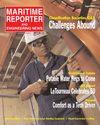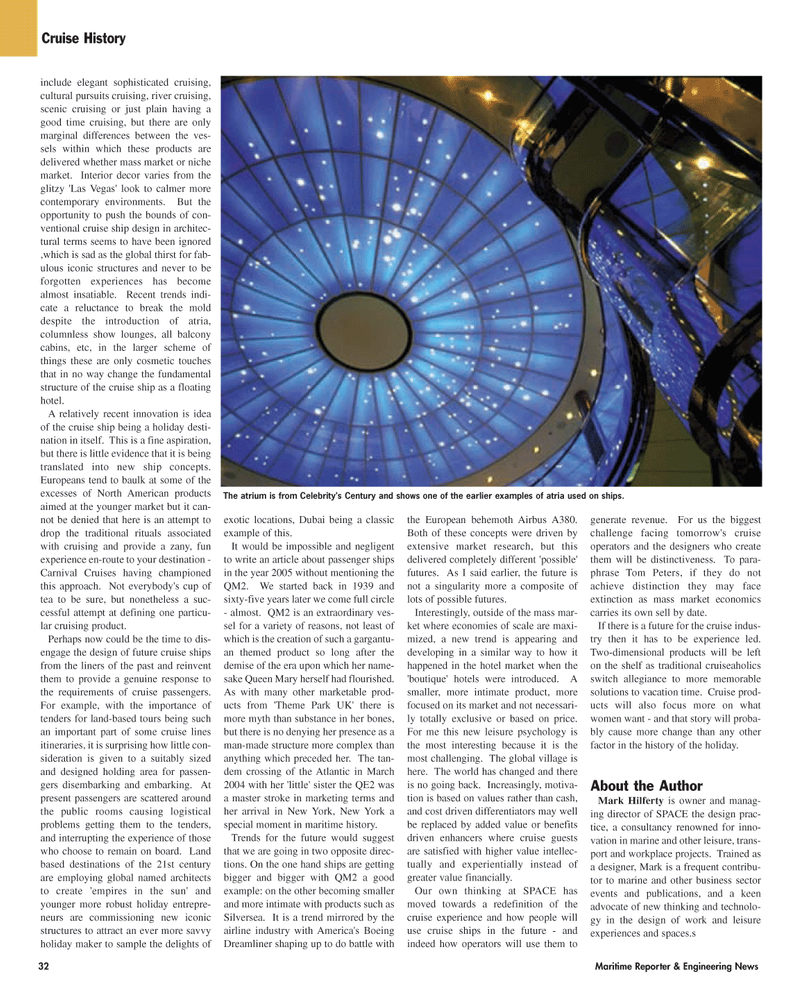
Page 32: of Maritime Reporter Magazine (August 2005)
AWO Edition: Inland & Offshore Waterways
Read this page in Pdf, Flash or Html5 edition of August 2005 Maritime Reporter Magazine
32 Maritime Reporter & Engineering News include elegant sophisticated cruising, cultural pursuits cruising, river cruising, scenic cruising or just plain having a good time cruising, but there are only marginal differences between the ves- sels within which these products are delivered whether mass market or niche market. Interior decor varies from the glitzy 'Las Vegas' look to calmer more contemporary environments. But the opportunity to push the bounds of con- ventional cruise ship design in architec- tural terms seems to have been ignored ,which is sad as the global thirst for fab- ulous iconic structures and never to be forgotten experiences has become almost insatiable. Recent trends indi- cate a reluctance to break the mold despite the introduction of atria, columnless show lounges, all balcony cabins, etc, in the larger scheme of things these are only cosmetic touches that in no way change the fundamental structure of the cruise ship as a floating hotel.
A relatively recent innovation is idea of the cruise ship being a holiday desti- nation in itself. This is a fine aspiration, but there is little evidence that it is being translated into new ship concepts.
Europeans tend to baulk at some of the excesses of North American products aimed at the younger market but it can- not be denied that here is an attempt to drop the traditional rituals associated with cruising and provide a zany, fun experience en-route to your destination -
Carnival Cruises having championed this approach. Not everybody's cup of tea to be sure, but nonetheless a suc- cessful attempt at defining one particu- lar cruising product.
Perhaps now could be the time to dis- engage the design of future cruise ships from the liners of the past and reinvent them to provide a genuine response to the requirements of cruise passengers.
For example, with the importance of tenders for land-based tours being such an important part of some cruise lines itineraries, it is surprising how little con- sideration is given to a suitably sized and designed holding area for passen- gers disembarking and embarking. At present passengers are scattered around the public rooms causing logistical problems getting them to the tenders, and interrupting the experience of those who choose to remain on board. Land based destinations of the 21st century are employing global named architects to create 'empires in the sun' and younger more robust holiday entrepre- neurs are commissioning new iconic structures to attract an ever more savvy holiday maker to sample the delights of exotic locations, Dubai being a classic example of this.
It would be impossible and negligent to write an article about passenger ships in the year 2005 without mentioning the
QM2. We started back in 1939 and sixty-five years later we come full circle - almost. QM2 is an extraordinary ves- sel for a variety of reasons, not least of which is the creation of such a gargantu- an themed product so long after the demise of the era upon which her name- sake Queen Mary herself had flourished.
As with many other marketable prod- ucts from 'Theme Park UK' there is more myth than substance in her bones, but there is no denying her presence as a man-made structure more complex than anything which preceded her. The tan- dem crossing of the Atlantic in March 2004 with her 'little' sister the QE2 was a master stroke in marketing terms and her arrival in New York, New York a special moment in maritime history.
Trends for the future would suggest that we are going in two opposite direc- tions. On the one hand ships are getting bigger and bigger with QM2 a good example: on the other becoming smaller and more intimate with products such as
Silversea. It is a trend mirrored by the airline industry with America's Boeing
Dreamliner shaping up to do battle with the European behemoth Airbus A380.
Both of these concepts were driven by extensive market research, but this delivered completely different 'possible' futures. As I said earlier, the future is not a singularity more a composite of lots of possible futures.
Interestingly, outside of the mass mar- ket where economies of scale are maxi- mized, a new trend is appearing and developing in a similar way to how it happened in the hotel market when the 'boutique' hotels were introduced. A smaller, more intimate product, more focused on its market and not necessari- ly totally exclusive or based on price.
For me this new leisure psychology is the most interesting because it is the most challenging. The global village is here. The world has changed and there is no going back. Increasingly, motiva- tion is based on values rather than cash, and cost driven differentiators may well be replaced by added value or benefits driven enhancers where cruise guests are satisfied with higher value intellec- tually and experientially instead of greater value financially.
Our own thinking at SPACE has moved towards a redefinition of the cruise experience and how people will use cruise ships in the future - and indeed how operators will use them to generate revenue. For us the biggest challenge facing tomorrow's cruise operators and the designers who create them will be distinctiveness. To para- phrase Tom Peters, if they do not achieve distinction they may face extinction as mass market economics carries its own sell by date.
If there is a future for the cruise indus- try then it has to be experience led.
Two-dimensional products will be left on the shelf as traditional cruiseaholics switch allegiance to more memorable solutions to vacation time. Cruise prod- ucts will also focus more on what women want - and that story will proba- bly cause more change than any other factor in the history of the holiday.
About the Author
Mark Hilferty is owner and manag- ing director of SPACE the design prac- tice, a consultancy renowned for inno- vation in marine and other leisure, trans- port and workplace projects. Trained as a designer, Mark is a frequent contribu- tor to marine and other business sector events and publications, and a keen advocate of new thinking and technolo- gy in the design of work and leisure experiences and spaces.s
Cruise History
The atrium is from Celebrity's Century and shows one of the earlier examples of atria used on ships.
MR AUGUST 2005 #4 (25-32).qxd 8/4/2005 6:09 PM Page 32

 31
31

 33
33
